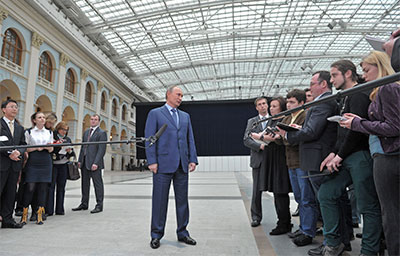In the year since Vladimir Putin returned to the Russian presidency, independent media, civil society groups, and opposition activists have been under attack. But as he has done in the past, Putin recently asserted that his government is not engaged in political repression.
In a televised address Thursday, “Direct Line with Vladimir Putin,” the Russian leader insisted there was no obstruction to freedom of speech in Russia and denied carrying out Stalinist-style measures against opposition activists and critical NGOs, according to CNN and Reuters.
CPJ and our partner groups disagree. The climate for human rights in Russia is at its worst since the collapse of the Soviet Union, Human Rights Watch said in a recent report. The headline on an Amnesty International report plainly accused Putin of carrying out a witch hunt. Presented in Moscow on Wednesday, both reports detail draconian laws and politicized prosecution of government opponents in Russia since Putin returned to high office in May 2012.
According to the new laws, local human rights groups and independent watchdogs that receive funding from abroad are required to brand themselves as “foreign agents”–a term that in Russia has connotation of a spy–or face exorbitant fines and closure; journalists once again face criminal prosecution if sued for libel; and Russian citizens working for international groups can be accused of treason.
However, when queried by Aleksei Venediktov, chief editor of the prominent Moscow-based radio station Ekho Moskvy, on measures such as Internet restrictions, imprisonment of the punk band Pussy Riot, prosecution of the popular opposition activist and blogger Aleksei Navalny, and raids of NGOs and human rights groups, Putin disagreed that he was moving Russia back toward the Stalinist era of political reprisals and prison camps.
Nobody can place restrictions on the Web, Putin said. “The Internet in reality is a space of freedom, and nothing can be limited or banned there.” However, “society may and should bar itself from pedophilia, child porn, distribution of drugs, and suicide teachings,” he added. Only these constraints are being enforced, Putin said.
However, CPJ research has found that Internet restrictions are being implemented without public oversight, and that there are questions about the availability of public access to the registry of sites that are banned; the appeal procedure for online publications, including international websites unfamiliar with Russian laws; and whether a ban applies to a certain page or an entire Web address.
As for NGOs, the president said, their work is welcome in Russia, but if they are sponsored by foreign donors and conduct political activity they must declare themselves as foreign agents. In July, Russian parliament members proposed bringing local media that received foreign funding under the law, the BBC reported. However, the proposal did not receive wide support in the Duma and was dropped.
Thousands of Russian non-governmental and human rights groups, including the Moscow offices of Human Rights Watch and Amnesty International, have been raided by Russian prosecutors since Putin said in February that the law must be enforced.
“The term ‘foreign agent’ in Russia is ubiquitously understood as spy or traitor, and it is difficult to avoid the impression that by adopting this law, Russian authorities sought to discredit and demonize certain civil society groups that accept foreign funding,” Human Rights Watch said in its report.
Even as Putin was speaking to the nation Thursday, a Moscow court ordered a local NGO, elections watchdog Golos, and its director, Lilia Shibanova, to pay a combined fine of 400,000 rubles (about US$12,800) for failing to register as a foreign agent. According to news reports, authorities accused Golos of accepting foreign funds when it was awarded the Andrei Sakharov human rights prize by the Norwegian Helsinki Committee in 2012, before the law took effect. The watchdog returned the money, but this did not affect the verdict.
As for the prosecution of Navalny, Pussy Riot, and other government opponents, the Russian leader said they were merely being held accountable for violating the law. “Nobody is putting anyone behind bars on purpose because of some political reasons. People are being sentenced not for their political views or actions, but for breaching the law. Everyone must abide by it,” Putin said.
UPDATE: This post has been changed to reflect the correct name of the Norwegian Helsinki Committee.
